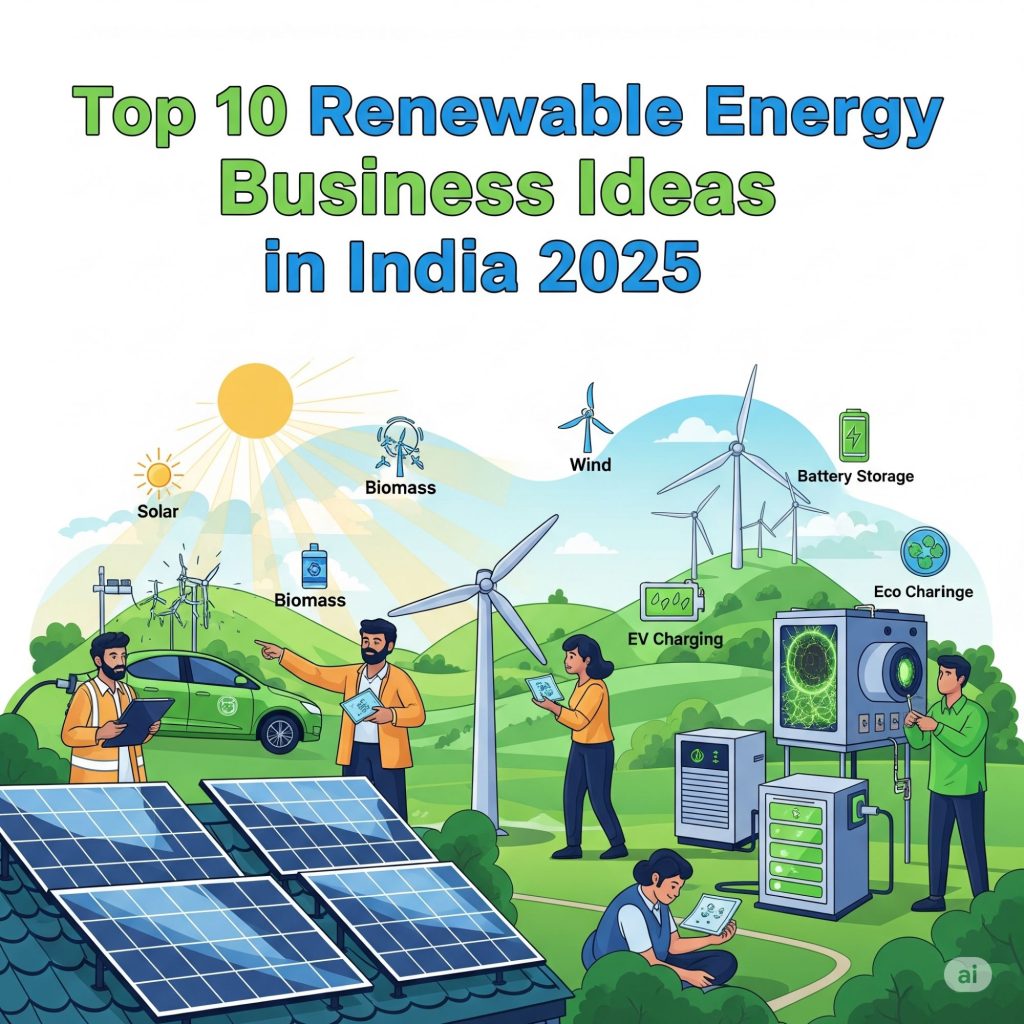Discover the top 10 renewable energy business ideas in India in 2025. Learn about solar, wind, biomass, and other sustainable energy opportunities for startups, investment potential, and step-by-step guidance to build a profitable green business.

Introduction
India is one of the fastest-growing renewable energy markets in the world. सरकार की नीतियाँ और बढ़ती जागरूकता, हरित ऊर्जा को अपनाने के लिए प्रोत्साहित कर रही हैं। Entrepreneurs can capitalize on this trend by starting renewable energy businesses that are profitable, scalable, and environmentally responsible.
In this blog, we will explore the top 10 renewable energy business ideas in India, analyze their market potential, investment requirements, step-by-step setup strategies, and share case studies of successful ventures.
—
1. Solar Panel Installation & Maintenance
Solar energy is India’s largest and fastest-growing renewable energy source.
Opportunities:
Residential and commercial solar panel installation
Solar-powered street lights and small-scale projects
Maintenance and repair services for solar systems
Investment & Profit Potential:
Small-scale: ₹2–5 lakh for initial setup
Medium-scale: ₹5–20 lakh for commercial projects
Profit margins: 20–35% per project
Why Trending:
Government incentives for solar adoption
Rising electricity costs and demand for green energy
Solar energy is reliable and scalable
Step-by-Step Tips:
1. Obtain necessary certifications for solar installation
2. Partner with manufacturers for panels and inverters
3. Target residential complexes, offices, and small businesses
4. Offer maintenance contracts for recurring revenue
Challenges:
Competition from established solar companies
Requires technical expertise and skilled workforce
Case Study:
Waaree Energies – One of India’s leading solar panel manufacturers and service providers, providing residential and commercial solar solutions.
—
2. Wind Energy Projects
Wind energy is gaining traction in states like Tamil Nadu, Gujarat, and Maharashtra.
Opportunities:
Small-scale wind turbine installation for businesses
Wind farm development for large-scale energy production
Maintenance and monitoring services
Investment & Profit Potential:
Small-scale: ₹5–15 lakh for mini-turbine setups
Large-scale: ₹50 lakh–2 crore for commercial wind farms
Profit margins: 15–30% depending on project size
Why Trending:
Wind energy reduces dependency on fossil fuels
Government policies promote wind energy adoption
Ideal for coastal and windy regions
Step-by-Step Tips:
1. Conduct feasibility study for wind potential
2. Obtain government permits and clearances
3. Partner with turbine manufacturers
4. Offer maintenance contracts and monitoring services
Challenges:
High initial capital investment
Regulatory approvals can be time-consuming
Case Study:
Suzlon Energy – Leading wind turbine manufacturer and project developer in India, with multiple wind farms across states.
—
3. Biomass Energy
Biomass energy uses agricultural and organic waste to generate electricity or biofuels.
Opportunities:
Biomass power plants for rural and industrial areas
Biofuel production for transport and cooking
Organic waste collection and processing
Investment & Profit Potential:
Small-scale: ₹2–10 lakh for biogas plants or small-scale biofuel setups
Medium-scale: ₹20–50 lakh for biomass power plants
Profit margins: 20–40% depending on scale
Why Trending:
Agricultural waste utilization reduces pollution
Government support for rural renewable energy projects
Biofuels are eco-friendly and cost-effective
Step-by-Step Tips:
1. Identify local biomass sources and demand
2. Set up biogas or biofuel production units
3. Collaborate with farmers or agricultural cooperatives
4. Market energy solutions to rural industries or households
Challenges:
Supply chain for raw biomass
Technology investment for efficient energy conversion
Case Study:
Chandrapur Biotech – Produces biomass-based energy solutions and biofuels for industrial use in India.
—
4. Energy Storage & Battery Solutions
Energy storage is critical for renewable energy efficiency, especially solar and wind.
Opportunities:
Lithium-ion or advanced battery manufacturing
Solar battery storage systems for homes and businesses
Backup power solutions and energy management systems
Investment & Profit Potential:
Small-scale: ₹5–10 lakh for local battery distribution
Medium-scale: ₹20–50 lakh for advanced battery solutions
Profit margins: 15–35% depending on technology
Why Trending:
Rising adoption of solar panels and electric vehicles
Energy storage ensures reliable power supply
Growing government incentives for storage solutions
Step-by-Step Tips:
1. Source advanced battery technology
2. Partner with renewable energy projects for integration
3. Offer maintenance and monitoring services
4. Educate consumers and businesses on energy storage benefits
Challenges:
Technology and safety compliance
High initial setup costs
Case Study:
Exide Industries – Provides energy storage and battery solutions for renewable and industrial applications.
5. Small Hydro Projects
Small hydroelectric projects generate electricity from rivers and streams, suitable for rural areas and hilly regions.
Opportunities:
Mini hydropower plants for villages or industrial areas
Micro-grids for remote communities
Consultancy for hydro project planning and installation
Investment & Profit Potential:
Small-scale: ₹10–30 lakh
Medium-scale: ₹50 lakh–2 crore for community or industrial projects
Profit margins: 15–30% depending on scale
Why Trending:
Provides reliable renewable energy to remote regions
Reduces dependency on fossil fuels
Government support for rural electrification
Step-by-Step Tips:
1. Identify suitable rivers or water sources
2. Conduct environmental and feasibility studies
3. Obtain government permits and clearances
4. Partner with local contractors for installation and maintenance
Challenges:
Regulatory approvals
Environmental impact assessments
Initial capital-intensive setup
Case Study:
Himachal Pradesh Small Hydro Projects – Multiple small hydro projects providing sustainable power to local communities.
—
6. Waste-to-Energy Solutions
Converting municipal and industrial waste into energy is a growing niche in India.
Opportunities:
Municipal solid waste-to-energy plants
Industrial waste conversion to electricity or biofuels
Consultancy for waste-to-energy projects
Investment & Profit Potential:
Small-scale: ₹10–25 lakh for mini-waste-to-energy units
Medium-scale: ₹50 lakh–2 crore for community-scale projects
Profit margins: 20–40% depending on efficiency and waste availability
Why Trending:
Rising urban waste problem
Government initiatives supporting waste-to-energy plants
Reduces landfill usage and promotes sustainability
Step-by-Step Tips:
1. Identify reliable waste sources
2. Choose appropriate technology for conversion (incineration, anaerobic digestion, pyrolysis)
3. Partner with municipalities or industrial units
4. Market energy solutions to industries and government projects
Challenges:
Waste collection logistics
High initial investment
Technology maintenance and operational expertise
Case Study:
Ramky Enviro Engineers – Manages waste-to-energy plants converting municipal and industrial waste into renewable power.
—
7. Electric Vehicle (EV) Charging Stations
With the rise of electric vehicles in India, EV charging infrastructure is a high-demand renewable energy business.
Opportunities:
Public EV charging stations
Home EV chargers for urban residents
Battery swapping and fast-charging solutions
Investment & Profit Potential:
Small-scale: ₹2–5 lakh for a single station or home charger setup
Medium-scale: ₹10–50 lakh for multiple commercial stations
Profit margins: 15–35% depending on scale and usage
Why Trending:
EV adoption is increasing rapidly in India
Government subsidies for EV infrastructure
Essential support for sustainable transport
Step-by-Step Tips:
1. Identify high-traffic areas for charging stations
2. Partner with EV manufacturers or municipalities
3. Offer subscription or pay-per-use pricing models
4. Maintain safety standards and software monitoring systems
Challenges:
Land availability and permissions
Technology investment and maintenance
Competition from established EV charging networks
Case Study:
Tata Power EV Charging Solutions – One of India’s leading providers of EV charging stations, supporting electric mobility growth.
—
8. Solar-Powered Appliances & Devices
Solar-powered products are in high demand in urban and rural India.
Opportunities:
Solar water heaters, cookers, and lamps
Solar-powered fans and refrigerators
Portable solar devices for homes and offices
Investment & Profit Potential:
Small-scale: ₹2–5 lakh for product sourcing and store setup
Medium-scale: ₹5–20 lakh for distribution and online presence
Profit margins: 20–40% depending on product type
Why Trending:
Rising electricity costs
Increased interest in green, sustainable products
Government incentives for solar appliances
Step-by-Step Tips:
1. Source certified solar appliances
2. Set up e-commerce or retail store
3. Offer after-sales service and maintenance
4. Highlight energy savings and eco-benefits in marketing campaigns
Challenges:
Product quality and certifications
Consumer education on usage and maintenance
Case Study:
Havells Solar Solutions – Provides solar-powered appliances and systems for residential and commercial use in India.
—
9. Green Consulting & Energy Audits
Businesses are increasingly hiring experts to reduce energy costs and adopt renewable solutions.
Opportunities:
Energy efficiency audits for industries and offices
Renewable energy project consulting
Carbon footprint analysis and sustainability reporting
Investment & Profit Potential:
Small-scale: ₹1–5 lakh for consultancy setup
Medium-scale: ₹5–15 lakh for team expansion and certifications
Profit: High due to service-based revenue model
Why Trending:
Regulatory requirements for sustainability
Cost savings through energy efficiency
Growing corporate awareness of green business practices
Step-by-Step Tips:
1. Gain certifications in energy auditing or sustainability
2. Build a client base of SMEs and large companies
3. Offer actionable recommendations and renewable solutions
4. Provide monitoring and follow-up services for recurring revenue
Challenges:
Requires technical knowledge and certifications
Establishing credibility in a competitive market
Case Study:
Energy Efficiency Services Limited (EESL) – Provides energy auditing and efficiency solutions for government and corporate clients.
—
10. Renewable Energy Training & Skill Development
As India expands its renewable energy sector, training and skill development is a growing opportunity.
Opportunities:
Technical training for solar, wind, and biomass installations
Certification courses for renewable energy professionals
Online e-learning platforms for sustainable energy courses
Investment & Profit Potential:
Small-scale: ₹50,000–₹2 lakh for training setup
Medium-scale: ₹2–10 lakh for course development and online platforms
Profit: Moderate to high depending on students and corporate clients
Why Trending:
High demand for skilled workforce in renewable energy
Government programs support renewable energy education
Opportunities in both rural and urban areas
Step-by-Step Tips:
1. Develop course curriculum for renewable energy technologies
2. Partner with training institutes or colleges
3. Offer online and offline training options
4. Include certification and placement support for students
Challenges:
Building a credible curriculum
Marketing and attracting students
Keeping training up-to-date with technology trends
Case Study:
National Institute of Solar Energy (NISE) – Offers training programs for solar energy professionals in India.
—
Conclusion
India’s renewable energy sector in 2025 is expanding rapidly, creating numerous opportunities for entrepreneurs, investors, and professionals. From solar, wind, and biomass to EV infrastructure, training, and consulting, renewable energy businesses are both profitable and sustainable.
Key takeaways:
Identify niches with high growth potential
Invest in skills, technology, and partnerships
Leverage government incentives and subsidies
Promote sustainability to attract eco-conscious consumers and businesses
भारत में हरित ऊर्जा और नवीकरणीय ऊर्जा के अवसर तेजी से बढ़ रहे हैं। सही योजना, तकनीक और निवेश रणनीति के साथ, व्यवसाय स्थायी और लाभकारी दोनों बन सकते हैं।
—
Internal Links
Top 10 Trending Business Opportunities in India 2025
Top AI Trends India 2025
Top E-Commerce Niches India 2025
External Links
MNRE – Ministry of New & Renewable Energy
Invest India – Renewable Energy Opportunities
IEA – India Renewable Energy



